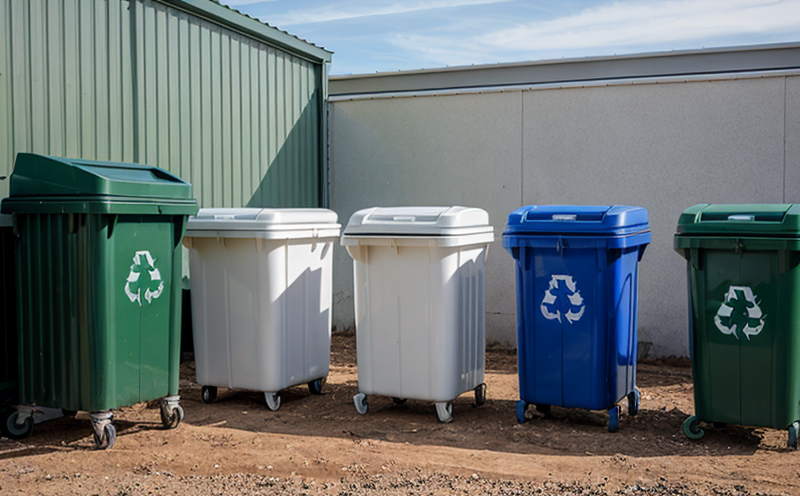ISO 14024-2 Environmental Labeling Assessment
The ISO 14024-2 standard provides a framework for conducting environmental labeling assessments. This service is critical in the packaging testing sector, particularly in ensuring that products meet stringent sustainability and recycling criteria. The assessment involves evaluating the environmental impacts of a product throughout its lifecycle, from raw material extraction to final disposal. This service helps companies comply with international standards and regulations, enhancing their reputation and market competitiveness.
Our team specializes in providing comprehensive ISO 14024-2 services tailored to packaging materials. We use advanced analytical techniques to assess the environmental impact of packaging components, including plastic, paperboard, and composite films. Our expertise ensures that clients receive accurate and reliable data on their product's environmental performance.
The assessment process begins with a thorough review of the product's lifecycle, identifying potential environmental impacts at each stage. This includes material sourcing, manufacturing processes, transportation, use, and disposal. For instance, in the case of plastic packaging, we evaluate factors such as energy consumption during production, chemical emissions, and end-of-life recycling rates.
Once the lifecycle assessment is complete, our team identifies key areas where improvements can be made to reduce environmental impact. Recommendations may include using more sustainable raw materials, optimizing manufacturing processes for lower emissions, or enhancing product design for easier recycling. These recommendations are then used to develop an effective environmental labeling strategy that accurately reflects the product's environmental performance.
Our ISO 14024-2 services also extend to helping clients navigate regulatory requirements related to environmental labeling. We ensure that all labels comply with international standards, such as ISO 14021 and ISO 14025, which provide guidelines for the development of environmental claims.
The implementation of an effective environmental labeling strategy is crucial for packaging companies aiming to reduce their carbon footprint. By providing accurate and transparent information about a product's environmental impact, businesses can make informed decisions that lead to sustainable practices and contribute positively to the environment.
In summary, our ISO 14024-2 services play a vital role in ensuring that packaging products meet high sustainability standards. Through detailed lifecycle assessments and targeted recommendations for improvement, we help clients create effective environmental labeling strategies that enhance their reputation and market position.
Why It Matters
The ISO 14024-2 standard is pivotal in the packaging testing sector as it provides a structured approach to assessing product sustainability. This service ensures that companies can meet growing consumer demand for environmentally responsible products while complying with regulatory requirements.
- Enhanced Reputation: By demonstrating commitment to sustainability, businesses can build trust and loyalty among customers.
- Regulatory Compliance: Many countries have implemented laws requiring environmental labeling of products. ISO 14024-2 helps companies stay compliant with these regulations.
- Innovation: The assessment process encourages companies to innovate by identifying areas for improvement in their product lifecycle.
The importance of this service cannot be overstated, especially as global efforts towards sustainability continue to grow. By adopting ISO 14024-2 standards, packaging companies can lead the way in creating more sustainable products and practices.
Industry Applications
The application of ISO 14024-2 services is extensive across various sectors within the packaging industry. Here are some key areas where this service is particularly valuable:
- Plastic Packaging: Evaluating the environmental impact of plastic materials and identifying ways to reduce waste.
- Paperboard Products: Assessing the sustainability of paper-based packaging, including sourcing practices and recycling potential.
- Composite Films: Analyzing multi-layered films for their environmental performance across different stages of use and disposal.
These applications highlight how ISO 14024-2 services contribute to the broader goal of creating more sustainable packaging solutions. By focusing on these specific materials, companies can make informed decisions that have a positive impact on the environment.
Environmental and Sustainability Contributions
The adoption of ISO 14024-2 standards not only benefits individual businesses but also contributes significantly to environmental sustainability at large. Here are some key contributions this service makes:
- Reduction in Carbon Footprint: By identifying areas for improvement, companies can reduce their overall carbon footprint.
- Increased Use of Recyclable Materials: Encouraging the use of materials that can be recycled or composted at the end of their life cycle.
- Enhanced Resource Efficiency: Optimizing resource usage throughout the product lifecycle to minimize waste and energy consumption.
Through these contributions, ISO 14024-2 services play a crucial role in promoting a more sustainable packaging industry. This not only benefits the environment but also supports global efforts towards sustainability and recycling.





